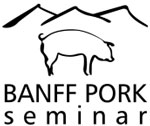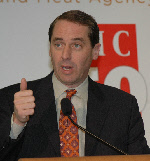



Technology, ‘Fighting the Fringe’ is Key to Pork Industry Progress
The pork industry needs to fight against ‘the fringe one per cent’ and champion technology to create a more prosperous industry and – more important – a better and more sustainable world, Jeff Simmons, President of Elanco Animal Health, told the 2012 Banff Pork Seminar.
Mr Simmons said: “It’s lofty stuff, but it’s also reality. And the sooner pork producers and other livestock industry players realise just how critical their role is, the better they can become the leaders the world needs to truly drive progress.
“You are the leaders,” he said, speaking at the Banff Pork Seminar, attended by over 600 industry players from across North America and around the globe. “You need to believe more and know where you fit in this global issue. You're dealing with the greatest issue this century. Have pride in what you do.”
The Banff Pork Seminar was attended by over 600 industry players from across North America and around the globe.
Feeding tomorrow’s world – the theme of the 2012 Seminar – may seem like a complex problem,” said Mr Simmons “but when it’s boiled down, the challenge and the solution become very clear.”

Mr Simmons continued: “My father always says if you can’t go into a coffee shop and tell it on a napkin, you can’t tell it. The napkin speeches are what we need when we talk about our industry and what we do.”
The reality is simple: food is an issue for half the world’s current population of seven billion and that number is projected to hit nine billion within the next four decades. Mr Simmons has a ‘napkin-speech’ based around three numbers that sums up what' is at stake and what is needed. He calls it the ‘50-100-70’ speech.
“In the year 2050, the world will require 100 per cent more food and 70 per cent of this food must come from efficiency-improving technology,” he said.
There is increasing awareness of the 50/100 part but not many people know about the 70 per cent solution.
He explained: “Nobody talks about the 70. And that’s a number from global organisations such as FAO and WHO, supported by economists the world over. All the knowledge out there says technology is where 70 per cent of the doubling has to come from.”
Industry Needs to Lead
Mr Simmons said that is a message that needs to get out, and no one is better equipped or more needed to deliver it than people within the livestock industries who represent the means by which it can happen.
He said: “We can boil it down our message to four words: safe, abundant, affordable food. That’s what we’re about and what we work on every day.”
The Bill and Melinda Gates Foundation, for one, has stated that farm productivity is the beginning of the solution to feeding the world and alleviating both poverty and hunger, he added.
More than Plant-Based
It is not just about plant-based food, according to Mr Simmons.
He said: “There’s greater demand now on the meat side than the plant side. The data shows there are three billion people every day that are trying to shift more from plants, more from rice and get milk, meat and eggs. It’s a huge demand driven heavily by rising GDPs, and it’s not in the population that’s coming – it’s in the population that’'s here right now.”
So where do the perceptions come from that people do not want more technology applied to food, that vegetarianism is on the rise and that more precautionary constraints are needed on technology innovations?
Mr Simmons said a lot of information comes from flawed surveys and the voices of a small minority becoming overblown. The best science-based data in fact shows 95 per cent of consumers are food buyers who are either neutral or supportive of using efficiency–enhancing technologies to grow food. Another four per cent are so–called ‘lifestyle buyers’ who choose foods based on lifestyle factors such as ethnicity or vegetarianism. Only a tiny percentage wants to eliminate food choices by banning specific agricultural technologies or methods.
He continued: “We can’t allow ourselves to get thrown off by the fringe one per cent. The vast majority of consumers want safe, affordable, tasty food, and choice in what they purchase.”
Stand up, Speak up
Another ‘napkin speech’ is this: livestock industries stand for ‘three rights’, he says: food, choice and sustainability.
Mr Simmons told his audience: “Tell it the coffee shop. Tell it to your neighbor. We also need to take these messages forward at the big, global level.”
A silver lining of the global recession is that it has brought more logic to the global food system, he said. “It makes it easier to see what’s important.”
The time is ripe for livestock industries to be active, outspoken leaders in addressing the food issue and championing technology solutions, he says.
“This is not a time to let up. We need to be more activist-like in our thinking and engage in the debates that are out there in all corners. When you consider what’s at stake, I say ‘bring it on’.”
Too aggressive? Not at all, Mr Simmons concluded. “One thing about activists: their fire is hot. We need to be activists too.”
Further Reading
| - | You can view other articles from the Banff Pork Seminar 2012 by clicking here. |
February 2012








